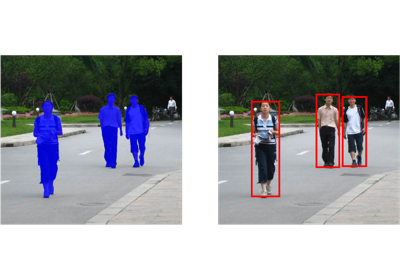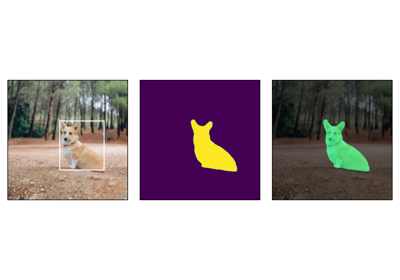torchvision.io
The torchvision.io package provides functions for performing IO
operations. They are currently specific to reading and writing video and
images.
Video
-
torchvision.io.read_video(filename: str, start_pts: Union[float, fractions.Fraction] = 0, end_pts: Optional[Union[float, fractions.Fraction]] = None, pts_unit: str = 'pts') → Tuple[torch.Tensor, torch.Tensor, Dict[str, Any]][source] Reads a video from a file, returning both the video frames as well as the audio frames
- Parameters
filename (str) – path to the video file
start_pts (int if pts_unit = 'pts', float / Fraction if pts_unit = 'sec', optional) – The start presentation time of the video
end_pts (int if pts_unit = 'pts', float / Fraction if pts_unit = 'sec', optional) – The end presentation time
pts_unit (str, optional) – unit in which start_pts and end_pts values will be interpreted, either ‘pts’ or ‘sec’. Defaults to ‘pts’.
- Returns
the T video frames aframes (Tensor[K, L]): the audio frames, where K is the number of channels and L is the number of points info (Dict): metadata for the video and audio. Can contain the fields video_fps (float) and audio_fps (int)
- Return type
vframes (Tensor[T, H, W, C])
-
torchvision.io.read_video_timestamps(filename: str, pts_unit: str = 'pts') → Tuple[List[int], Optional[float]][source] List the video frames timestamps.
Note that the function decodes the whole video frame-by-frame.
- Parameters
- Returns
presentation timestamps for each one of the frames in the video. video_fps (float, optional): the frame rate for the video
- Return type
pts (List[int] if pts_unit = ‘pts’, List[Fraction] if pts_unit = ‘sec’)
-
torchvision.io.write_video(filename: str, video_array: torch.Tensor, fps: float, video_codec: str = 'libx264', options: Optional[Dict[str, Any]] = None, audio_array: Optional[torch.Tensor] = None, audio_fps: Optional[float] = None, audio_codec: Optional[str] = None, audio_options: Optional[Dict[str, Any]] = None) → None[source] Writes a 4d tensor in [T, H, W, C] format in a video file
- Parameters
filename (str) – path where the video will be saved
video_array (Tensor[T, H, W, C]) – tensor containing the individual frames, as a uint8 tensor in [T, H, W, C] format
fps (Number) – video frames per second
video_codec (str) – the name of the video codec, i.e. “libx264”, “h264”, etc.
options (Dict) – dictionary containing options to be passed into the PyAV video stream
audio_array (Tensor[C, N]) – tensor containing the audio, where C is the number of channels and N is the number of samples
audio_fps (Number) – audio sample rate, typically 44100 or 48000
audio_codec (str) – the name of the audio codec, i.e. “mp3”, “aac”, etc.
audio_options (Dict) – dictionary containing options to be passed into the PyAV audio stream
Fine-grained video API
In addition to the read_video function, we provide a high-performance
lower-level API for more fine-grained control compared to the read_video function.
It does all this whilst fully supporting torchscript.
-
class
torchvision.io.VideoReader(path: str, stream: str = 'video')[source] Fine-grained video-reading API. Supports frame-by-frame reading of various streams from a single video container.
Example
The following examples creates a
VideoReaderobject, seeks into 2s point, and returns a single frame:import torchvision video_path = "path_to_a_test_video" reader = torchvision.io.VideoReader(video_path, "video") reader.seek(2.0) frame = next(reader)
VideoReaderimplements the iterable API, which makes it suitable to using it in conjunction withitertoolsfor more advanced reading. As such, we can use aVideoReaderinstance inside for loops:reader.seek(2) for frame in reader: frames.append(frame['data']) # additionally, `seek` implements a fluent API, so we can do for frame in reader.seek(2): frames.append(frame['data'])
With
itertools, we can read all frames between 2 and 5 seconds with the following code:for frame in itertools.takewhile(lambda x: x['pts'] <= 5, reader.seek(2)): frames.append(frame['data'])
and similarly, reading 10 frames after the 2s timestamp can be achieved as follows:
for frame in itertools.islice(reader.seek(2), 10): frames.append(frame['data'])
Note
Each stream descriptor consists of two parts: stream type (e.g. ‘video’) and a unique stream id (which are determined by the video encoding). In this way, if the video contaner contains multiple streams of the same type, users can acces the one they want. If only stream type is passed, the decoder auto-detects first stream of that type.
- Parameters
path (string) – Path to the video file in supported format
stream (string, optional) – descriptor of the required stream, followed by the stream id, in the format
{stream_type}:{stream_id}. Defaults to"video:0". Currently available options include['video', 'audio']
Examples using
VideoReader:-
__next__() → Dict[str, Any][source] Decodes and returns the next frame of the current stream. Frames are encoded as a dict with mandatory data and pts fields, where data is a tensor, and pts is a presentation timestamp of the frame expressed in seconds as a float.
- Returns
a dictionary and containing decoded frame (
data) and corresponding timestamp (pts) in seconds- Return type
(dict)
-
get_metadata() → Dict[str, Any][source] Returns video metadata
- Returns
dictionary containing duration and frame rate for every stream
- Return type
(dict)
-
seek(time_s: float) → torchvision.io.VideoReader[source] Seek within current stream.
- Parameters
time_s (float) – seek time in seconds
Note
Current implementation is the so-called precise seek. This means following seek, call to
next()will return the frame with the exact timestamp if it exists or the first frame with timestamp larger thantime_s.
-
set_current_stream(stream: str) → bool[source] Set current stream. Explicitly define the stream we are operating on.
- Parameters
stream (string) – descriptor of the required stream. Defaults to
"video:0"Currently available stream types include['video', 'audio']. Each descriptor consists of two parts: stream type (e.g. ‘video’) and a unique stream id (which are determined by video encoding). In this way, if the video contaner contains multiple streams of the same type, users can acces the one they want. If only stream type is passed, the decoder auto-detects first stream of that type and returns it.- Returns
True on succes, False otherwise
- Return type
(bool)
Example of inspecting a video:
import torchvision
video_path = "path to a test video"
# Constructor allocates memory and a threaded decoder
# instance per video. At the moment it takes two arguments:
# path to the video file, and a wanted stream.
reader = torchvision.io.VideoReader(video_path, "video")
# The information about the video can be retrieved using the
# `get_metadata()` method. It returns a dictionary for every stream, with
# duration and other relevant metadata (often frame rate)
reader_md = reader.get_metadata()
# metadata is structured as a dict of dicts with following structure
# {"stream_type": {"attribute": [attribute per stream]}}
#
# following would print out the list of frame rates for every present video stream
print(reader_md["video"]["fps"])
# we explicitly select the stream we would like to operate on. In
# the constructor we select a default video stream, but
# in practice, we can set whichever stream we would like
video.set_current_stream("video:0")
Image
-
class
torchvision.io.ImageReadMode(value)[source] Support for various modes while reading images.
Use
ImageReadMode.UNCHANGEDfor loading the image as-is,ImageReadMode.GRAYfor converting to grayscale,ImageReadMode.GRAY_ALPHAfor grayscale with transparency,ImageReadMode.RGBfor RGB andImageReadMode.RGB_ALPHAfor RGB with transparency.
-
torchvision.io.read_image(path: str, mode: torchvision.io.image.ImageReadMode = <ImageReadMode.UNCHANGED: 0>) → torch.Tensor[source] Reads a JPEG or PNG image into a 3 dimensional RGB Tensor. Optionally converts the image to the desired format. The values of the output tensor are uint8 between 0 and 255.
- Parameters
path (str) – path of the JPEG or PNG image.
mode (ImageReadMode) – the read mode used for optionally converting the image. Default:
ImageReadMode.UNCHANGED. SeeImageReadModeclass for more information on various available modes.
- Returns
output (Tensor[image_channels, image_height, image_width])
Examples using
read_image:
-
torchvision.io.decode_image(input: torch.Tensor, mode: torchvision.io.image.ImageReadMode = <ImageReadMode.UNCHANGED: 0>) → torch.Tensor[source] Detects whether an image is a JPEG or PNG and performs the appropriate operation to decode the image into a 3 dimensional RGB Tensor.
Optionally converts the image to the desired format. The values of the output tensor are uint8 between 0 and 255.
- Parameters
input (Tensor) – a one dimensional uint8 tensor containing the raw bytes of the PNG or JPEG image.
mode (ImageReadMode) – the read mode used for optionally converting the image. Default:
ImageReadMode.UNCHANGED. SeeImageReadModeclass for more information on various available modes.
- Returns
output (Tensor[image_channels, image_height, image_width])
-
torchvision.io.encode_jpeg(input: torch.Tensor, quality: int = 75) → torch.Tensor[source] Takes an input tensor in CHW layout and returns a buffer with the contents of its corresponding JPEG file.
- Parameters
input (Tensor[channels, image_height, image_width])) – int8 image tensor of
cchannels, wherecmust be 1 or 3.quality (int) – Quality of the resulting JPEG file, it must be a number between 1 and 100. Default: 75
- Returns
- A one dimensional int8 tensor that contains the raw bytes of the
JPEG file.
- Return type
output (Tensor[1])
-
torchvision.io.decode_jpeg(input: torch.Tensor, mode: torchvision.io.image.ImageReadMode = <ImageReadMode.UNCHANGED: 0>, device: str = 'cpu') → torch.Tensor[source] Decodes a JPEG image into a 3 dimensional RGB Tensor. Optionally converts the image to the desired format. The values of the output tensor are uint8 between 0 and 255.
- Parameters
input (Tensor[1]) – a one dimensional uint8 tensor containing the raw bytes of the JPEG image. This tensor must be on CPU, regardless of the
deviceparameter.mode (ImageReadMode) – the read mode used for optionally converting the image. Default:
ImageReadMode.UNCHANGED. SeeImageReadModeclass for more information on various available modes.device (str or torch.device) – The device on which the decoded image will be stored. If a cuda device is specified, the image will be decoded with nvjpeg. This is only supported for CUDA version >= 10.1
- Returns
output (Tensor[image_channels, image_height, image_width])
-
torchvision.io.write_jpeg(input: torch.Tensor, filename: str, quality: int = 75)[source] Takes an input tensor in CHW layout and saves it in a JPEG file.
-
torchvision.io.encode_png(input: torch.Tensor, compression_level: int = 6) → torch.Tensor[source] Takes an input tensor in CHW layout and returns a buffer with the contents of its corresponding PNG file.
- Parameters
input (Tensor[channels, image_height, image_width]) – int8 image tensor of
cchannels, wherecmust 3 or 1.compression_level (int) – Compression factor for the resulting file, it must be a number between 0 and 9. Default: 6
- Returns
- A one dimensional int8 tensor that contains the raw bytes of the
PNG file.
- Return type
Tensor[1]
-
torchvision.io.decode_png(input: torch.Tensor, mode: torchvision.io.image.ImageReadMode = <ImageReadMode.UNCHANGED: 0>) → torch.Tensor[source] Decodes a PNG image into a 3 dimensional RGB Tensor. Optionally converts the image to the desired format. The values of the output tensor are uint8 between 0 and 255.
- Parameters
input (Tensor[1]) – a one dimensional uint8 tensor containing the raw bytes of the PNG image.
mode (ImageReadMode) – the read mode used for optionally converting the image. Default:
ImageReadMode.UNCHANGED. See ImageReadMode class for more information on various available modes.
- Returns
output (Tensor[image_channels, image_height, image_width])
-
torchvision.io.write_png(input: torch.Tensor, filename: str, compression_level: int = 6)[source] Takes an input tensor in CHW layout (or HW in the case of grayscale images) and saves it in a PNG file.
-
torchvision.io.read_file(path: str) → torch.Tensor[source] Reads and outputs the bytes contents of a file as a uint8 Tensor with one dimension.
- Parameters
path (str) – the path to the file to be read
- Returns
data (Tensor)
-
torchvision.io.write_file(filename: str, data: torch.Tensor) → None[source] Writes the contents of a uint8 tensor with one dimension to a file.
- Parameters
filename (str) – the path to the file to be written
data (Tensor) – the contents to be written to the output file




